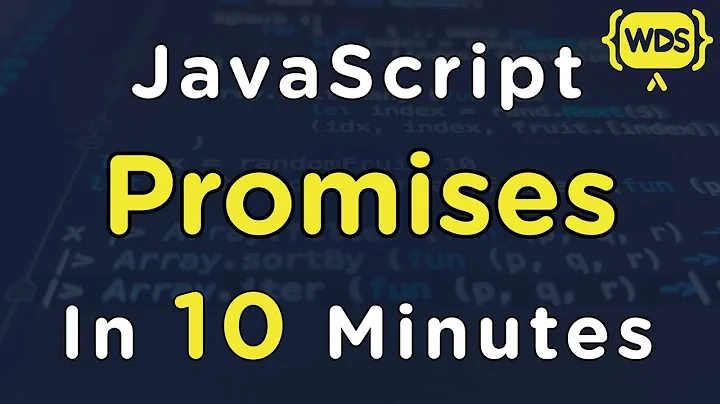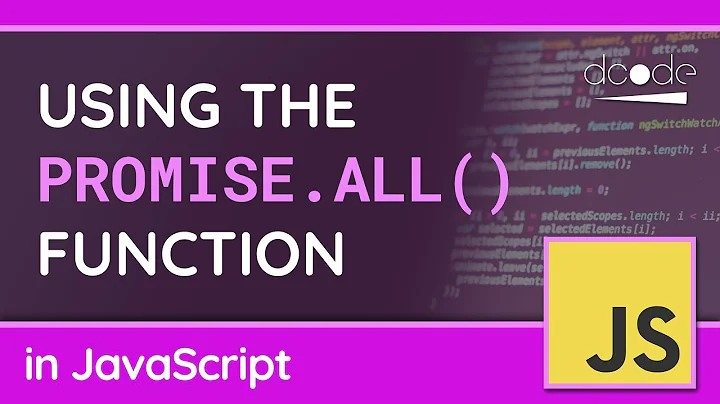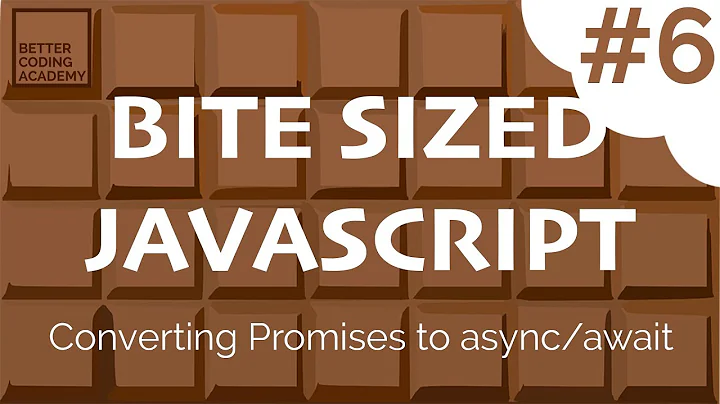How to return many Promises and wait for them all before doing other stuff
Solution 1
You can use Promise.all (spec, MDN) for that: It accepts a bunch of individual promises and gives you back a single promise that is resolved when all of the ones you gave it are resolved, or rejected when any of them is rejected.
So if you make doSomeAsyncStuff return a promise, then:
const promises = [];
// ^^^^^−−−−−−−−−−−−−−−−−−−−−−−−−−− use `const` or `let`, not `var`
for (let i = 0; i < 5; i++) {
// ^^^−−−−−−−−−−−−−−−−−−−−−−−− added missing declaration
promises.push(doSomeAsyncStuff());
}
Promise.all(promises)
.then(() => {
for (let i = 0; i < 5; i++) {
// ^^^−−−−−−−−−−−−−−−− added missing declaration
doSomeStuffOnlyWhenTheAsyncStuffIsFinish();
}
})
.catch((e) => {
// handle errors here
});
MDN has an article on promises here. I also cover promsies in detail in Chapter 8 of my book JavaScript: The New Toys, links in my profile if you're interested.
Here's an example:
function doSomethingAsync(value) {
return new Promise((resolve) => {
setTimeout(() => {
console.log("Resolving " + value);
resolve(value);
}, Math.floor(Math.random() * 1000));
});
}
function test() {
const promises = [];
for (let i = 0; i < 5; ++i) {
promises.push(doSomethingAsync(i));
}
Promise.all(promises)
.then((results) => {
console.log("All done", results);
})
.catch((e) => {
// Handle errors here
});
}
test();Sample output (because of the Math.random, what finishes first may vary):
Resolving 3 Resolving 2 Resolving 1 Resolving 4 Resolving 0 All done [0,1,2,3,4]
Solution 2
A reusable function works nicely for this pattern:
function awaitAll(count, asyncFn) {
const promises = [];
for (i = 0; i < count; ++i) {
promises.push(asyncFn());
}
return Promise.all(promises);
}
OP example:
awaitAll(5, doSomeAsyncStuff)
.then(results => console.log('doSomeStuffOnlyWhenTheAsyncStuffIsFinished', results))
.catch(e => console.error(e));
A related pattern, is iterating over an array and performing an async operation on each item:
function awaitAll(list, asyncFn) {
const promises = [];
list.forEach(x => {
promises.push(asyncFn(x));
});
return Promise.all(promises);
}
Example:
const books = [{ id: 1, name: 'foo' }, { id: 2, name: 'bar' }];
function doSomeAsyncStuffWith(book) {
return Promise.resolve(book.name);
}
awaitAll(books, doSomeAsyncStuffWith)
.then(results => console.log('doSomeStuffOnlyWhenTheAsyncStuffIsFinished', results))
.catch(e => console.error(e));
Solution 3
const doSomeAsyncStuff = async (funcs) => {
const allPromises = funcs.map(func => func());
return await Promise.all(allPromises);
}
doSomeAsyncStuff([
() => new Promise(resolve => setTimeout(() => resolve(), 100)),
() => new Promise(resolve => setTimeout(() => resolve(), 100)),
() => new Promise(resolve => setTimeout(() => resolve(), 100)),
() => new Promise(resolve => setTimeout(() => resolve(), 100)),
() => new Promise(resolve => setTimeout(() => resolve(), 100)),
]);
Solution 4
Here is code that I wrote for myself in order to understand the answers stated here. I have mongoose queries in a for loop, so I put here the asyncFunction to take its place. Hope it helps anyone. You can run this script in node or any of many Javascript runtimes.
let asyncFunction = function(value, callback)
{
setTimeout(function(){console.log(value); callback();}, 1000);
}
// a sample function run without promises
asyncFunction(10,
function()
{
console.log("I'm back 10");
}
);
//here we use promises
let promisesArray = [];
let p = new Promise(function(resolve)
{
asyncFunction(20,
function()
{
console.log("I'm back 20");
resolve(20);
}
);
});
promisesArray.push(p);
for(let i = 30; i < 80; i += 10)
{
let p = new Promise(function(resolve)
{
asyncFunction(i,
function()
{
console.log("I'm back " + i);
resolve(i);
}
);
});
promisesArray.push(p);
}
// We use Promise.all to execute code after all promises are done.
Promise.all(promisesArray).then(
function()
{
console.log("all promises resolved!");
}
)
Solution 5
/*** Worst way ***/
for(i=0;i<10000;i++){
let data = await axios.get(
"https://yourwebsite.com/get_my_data/"
)
//do the statements and operations
//that are dependant on data
}
//Your final statements and operations
//That will be performed when the loop ends
//=> this approach will perform very slow as all the api call
// will happen in series
/*** One of the Best way ***/
const yourAsyncFunction = async (anyParams) => {
let data = await axios.get(
"https://yourwebsite.com/get_my_data/"
)
//all you statements and operations here
//that are dependant on data
}
var promises = []
for(i=0;i<10000;i++){
promises.push(yourAsyncFunction(i))
}
await Promise.all(promises)
//Your final statement / operations
//that will run once the loop ends
//=> this approach will perform very fast as all the api call
// will happen in parallalRelated videos on Youtube
Ganbin
Javascript Developer http://www.ajar.ch/ http://wakanda.io/ http://wakanda.org/
Updated on July 15, 2021Comments
-
 Ganbin almost 3 years
Ganbin almost 3 yearsI have a loop which calls a method that does stuff asynchronously. This loop can call the method many times. After this loop, I have another loop that needs to be executed only when all the asynchronous stuff is done.
So this illustrates what I want:
for (i = 0; i < 5; i++) { doSomeAsyncStuff(); } for (i = 0; i < 5; i++) { doSomeStuffOnlyWhenTheAsyncStuffIsFinish(); }I'm not very familiar with promises, so could anyone help me to achieve this?
This is how my
doSomeAsyncStuff()behaves:function doSomeAsyncStuff() { var editor = generateCKEditor(); editor.on('instanceReady', function(evt) { doSomeStuff(); // There should be the resolve() of the promises I think. }) }Maybe I have to do something like this:
function doSomeAsyncStuff() { var editor = generateCKEditor(); return new Promise(function(resolve,refuse) { editor.on('instanceReady', function(evt) { doSomeStuff(); resolve(true); }); }); }But I'm not sure of the syntax.
-
 T.J. Crowder almost 9 yearsAre you in control of the asynchronous calls? Do they already return promises, or can you make them return promises?
T.J. Crowder almost 9 yearsAre you in control of the asynchronous calls? Do they already return promises, or can you make them return promises? -
Vale almost 9 yearsWhat exactly is the sequence? Do you need to call the other functions after all the previous async ones are finished? Or do you just need to call a function after each of the async are finished?
-
 Ganbin almost 9 yearsFor now the first function doesn't return promises. That I have to implement. I want to edit my message to add some details of the workflow of my functions. And yes I need that all the stuff of the first loop to be finish before start to execute the stuff in the second loop.
Ganbin almost 9 yearsFor now the first function doesn't return promises. That I have to implement. I want to edit my message to add some details of the workflow of my functions. And yes I need that all the stuff of the first loop to be finish before start to execute the stuff in the second loop. -
 T.J. Crowder almost 9 yearsRe your edit: "Maybe I have to do something like that" Yup, very much like that, except there's no
T.J. Crowder almost 9 yearsRe your edit: "Maybe I have to do something like that" Yup, very much like that, except there's nosat the end ofPromise.
-
-
 Ganbin almost 9 yearsOk thanks I try this now and I come with feedback in few minutes.
Ganbin almost 9 yearsOk thanks I try this now and I come with feedback in few minutes. -
 Ganbin almost 9 yearsWow, thanks a lot, now I understand much more the promises.I read a lot about promises, but until we need to use them in real code, we don't really understand all the mechanisms. Now I get it better and I can start to write cool stuff, thanks to you.
Ganbin almost 9 yearsWow, thanks a lot, now I understand much more the promises.I read a lot about promises, but until we need to use them in real code, we don't really understand all the mechanisms. Now I get it better and I can start to write cool stuff, thanks to you. -
 OK sure over 6 yearsAlso, if you want to get these tasks to complete in order for any reason (for example mocking progress), you can change
OK sure over 6 yearsAlso, if you want to get these tasks to complete in order for any reason (for example mocking progress), you can changeMath.floor(Math.random() * 1000)to(i * 1000) -
 Ajit Singh over 5 years@TJ now how i can render the result data to the view and there i can do the loop to show the data
Ajit Singh over 5 years@TJ now how i can render the result data to the view and there i can do the loop to show the data -
 noobCoder about 5 yearsif
noobCoder about 5 yearsifdoSomethingAsync(i)returns a promise how to wait for that to finish along with others in the loop? -
 T.J. Crowder about 5 years
T.J. Crowder about 5 years -
user1063287 almost 5 yearsInstead of
Promise.all(promises).then( results) => { } ).catch((e) => { }), is it possible to usetry { var results = await Promises.all(promises); // continue with code here } catch (err) { // handle error here }? I am just wondering if both constructs achieve the same thing? -
 T.J. Crowder almost 5 years@user1063287 - You can do that if the code is in a context where
T.J. Crowder almost 5 years@user1063287 - You can do that if the code is in a context whereawaitis allowed. At the moment, the only place you can useawaitis inside anasyncfunction. (At some point you'll also be able to use it at the top level of modules.) -
Shaun Vermaak almost 4 yearsThis really makes code easier to understand and cleaner. I don't think the current example (which was obviously adapted to OP's code) does this justice. This is a neat trick, thanks!
-
 T.J. Crowder almost 3 yearsThanks @Henke! I've fixed the link.
T.J. Crowder almost 3 yearsThanks @Henke! I've fixed the link.




![Waiting For The End [Official Music Video] - Linkin Park](https://i.ytimg.com/vi/5qF_qbaWt3Q/hq720.jpg?sqp=-oaymwEcCNAFEJQDSFXyq4qpAw4IARUAAIhCGAFwAcABBg==&rs=AOn4CLBiOwdaEP46sbvFQLviJOn0LmOU2A)







